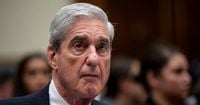On September 1, 2025, the U.S. House Oversight Committee abruptly withdrew its subpoena for former FBI Director Robert Mueller, ending plans to compel his testimony in the ongoing investigation into the Justice Department’s handling of the Jeffrey Epstein sex trafficking case. The decision came just hours after Mueller’s family publicly disclosed that the 81-year-old has been living with Parkinson’s disease since the summer of 2021, a diagnosis that has left him with significant speech and mobility difficulties in recent months, according to The New York Times and several other outlets.
Mueller’s family, in a statement provided to The New York Times, said, “Bob was diagnosed with Parkinson’s disease in the summer of 2021. He retired from the practice of law at the end of that year. He taught at his law school alma mater during the fall of both 2021 and 2022, and he retired at the end of 2022. His family asks that his privacy be respected.” The family’s request for privacy was echoed across media coverage, as the news rippled through Washington and beyond.
The House Oversight Committee, led by Chairman James Comer of Kentucky, had issued the subpoena in early August, hoping to question Mueller about his knowledge of the FBI’s investigations into Epstein during Mueller’s long tenure as director from 2001 to 2013. Comer wrote to Mueller, “Because you were FBI director during the time when Mr. Epstein was under investigation by the FBI, the committee believes that you possess knowledge and information relevant to its investigation.” According to ABC News and Newsmax, Comer was seeking clarity on decisions made by federal authorities, especially regarding a controversial nonprosecution agreement reached with Epstein in 2008, which allowed the wealthy financier to plead guilty to lesser state charges and serve just 13 months in a local prison, with generous work-release privileges. This deal faced renewed scrutiny after Epstein’s 2019 indictment and subsequent death in federal custody, which was ruled a suicide.
Mueller’s role as FBI director overlapped with the years when Epstein was first investigated for sex crimes. In 2008, the U.S. attorney in Miami, Alexander Acosta, negotiated the nonprosecution agreement, a decision that has since been criticized for its leniency, especially as Epstein was later accused of continuing to abuse underage girls. While it remains unclear how directly involved Mueller was in the Epstein investigation, Comer and other lawmakers argued that his insights would shed light on the government’s actions during that period. As The New York Times noted, Comer’s inquiry was not limited to Mueller; subpoenas were also issued to other former Justice Department and FBI officials, as well as high-profile political figures.
The committee’s reversal came swiftly after the public learned of Mueller’s health struggles. A spokesperson for the panel confirmed to ABC News, “We’ve learned that Mr. Mueller has health issues that preclude him from being able to testify.” The statement reflected a bipartisan recognition of the seriousness of Mueller’s condition and a willingness to respect his family’s wishes for privacy.
Mueller’s diagnosis of Parkinson’s disease—a progressive neurological disorder that affects movement, balance, and speech—was first made in the summer of 2021. According to AP and CTV News, symptoms of Parkinson’s typically begin with tremors and can include slow movement, a shuffling gait, stiff limbs, balance problems, and slurred speech. While there is no cure, treatments can help manage symptoms in the early stages. Most people diagnosed with Parkinson’s are over the age of 60, and the disease’s progression varies widely among individuals. In Mueller’s case, people familiar with his condition told The New York Times that his speech and mobility had declined noticeably over the past several months, making public appearances and testimony increasingly difficult.
Mueller’s health had been a topic of quiet speculation in Washington since his July 2019 congressional testimony about his work as special counsel investigating Russian interference in the 2016 presidential election. During that appearance, observers noted that Mueller’s delivery was sometimes halting and his demeanor subdued. In his 2022 memoir, former Attorney General William Barr described a key 2019 meeting with Mueller: “During a key meeting to discuss the findings of Mr. Mueller’s investigation in 2019, Mr. Mueller’s hands were trembling and his voice was tremulous. I knew he wasn’t nervous, and I wondered if he might have an illness.” Barr later recounted discussing with then-Deputy Attorney General Rod Rosenstein whether Mueller was unwell, with Barr remarking, “Bob has lost a step.” According to The New York Times, it was about two years after that testimony that Mueller received his Parkinson’s diagnosis.
Despite his declining health, Mueller remained active after leaving the FBI, retiring from law practice at the end of 2021 and teaching at his law school alma mater during the fall semesters of 2021 and 2022. He fully retired at the end of 2022, stepping back from public life and, as his family emphasized, seeking privacy. According to Newsmax and Nexstar Media, Mueller has not made public statements or given interviews in recent years, maintaining the low profile for which he was long known.
Mueller’s storied career has left an indelible mark on American law enforcement and politics. Appointed FBI director by President George W. Bush just two weeks before the September 11, 2001 terrorist attacks, he shepherded the bureau through a period of dramatic transformation, turning it into a national security and intelligence-gathering agency. His leadership spanned over a decade, making him the longest-serving FBI director since J. Edgar Hoover. In 2017, he was appointed special counsel to investigate possible coordination between Donald Trump’s 2016 presidential campaign and Russian operatives. The two-year investigation uncovered extensive Russian interference and resulted in criminal charges against several Trump associates, but ultimately did not find sufficient evidence to prove an illegal conspiracy to sway the election.
Mueller’s reputation for thoroughness and integrity earned him respect across the political spectrum, though his work was not without controversy. Defenders who worked closely with him during the special counsel investigation insisted that, despite signs of aging, he remained sharp and fully in command of his team, making all major investigative decisions. Yet, as his health challenges became more apparent, even his most ardent supporters acknowledged the toll of a long and demanding career in public service.
As the House Oversight Committee continues its probe into the government’s handling of the Epstein case, the withdrawal of Mueller’s subpoena marks a poignant moment. It is a reminder both of the personal costs borne by public servants and of the complexities involved in revisiting some of the most fraught chapters in recent American legal history. For now, Robert Mueller’s voice will not be added to the congressional record on Epstein, but his legacy—marked by duty, discretion, and, now, resilience in the face of illness—remains firmly in place.





